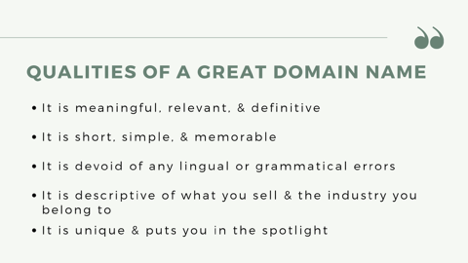by Alisha Shibli
Building a successful startup requires laying the right foundation. To enable your business to transform into a powerhouse brand and stand out in its niche, you need to give it a memorable and intuitive identity. Given the plethora of choices, finding the right domain name for your business can become an overwhelming task.
Your domain name is the key element of your overall branding. That’s because your domain name will more than likely be your users’ first touchpoint with your brand. In fact, a brandable domain name is one of the most valuable assets a business can own.
Think about this for a second—a long, clunky, misspelled domain name will not only make your domain name look spammy and hurt your credibility, but it will also be difficult to remember. Can you imagine all the potential opportunities you’d miss out on?
In this article, we’ll take stock of the ingredients needed to concoct a perfect domain name and explore how you, too, can choose a winning web address for your business.
What makes a great domain name?
Your startup’s identity should do justice to all the effort you’ve put into establishing it. So, when you start the hunt for a good domain name, keep in mind all the qualities that make for a great domain name.

A great domain name is:
- Meaningful, relevant, and definitive
- Short, simple, and memorable
- Devoid of any linguistic or grammatical errors
- Descriptive of what you sell and the industry you belong to
- Unique and puts you in the spotlight
How to choose a winning domain name for your startup
Keeping in mind these qualities of a great domain name, here are 7 tips for choosing the right domain name for your startup:
1. Keep it short
A short domain name is easy to understand and easy to remember. An ideal domain name should be less than 18 characters. Some of the biggest, most successful brands follow this simple rule and stick with domain names that are short and meaningful. For example:
- www.microsoft.com
- www.apple.com
- www.samsung.com
A good domain name has a subtle ring to it and adds value to a business’s overall branding.
However, most short names in conventional extensions are already registered. One option is picking a domain name in an industry-relevant extension. For example, Emirates, an airline industry giant, chose www.emirates.store for their merchandise store. So did a London-based small business, Husk, with www.husk.store. More examples of short and snappy domain names include:
- www.louder.online
- www.shadow.tech
- www.untold.site
2. Avoid misspelled names, numbers, and hyphens
Along with keeping things short, it’s important to keep it simple. Including numbers, hyphens, special characters, abbreviation, or misspelled words as part of your domain name makes it too complicated to remember and hard to communicate verbally.
For example, www.squaresix.site would be a better domain name as compared to www.square-6site.com or www.square6.site.
3. Make your domain name radio test friendly
One way to make sure you’re keeping your domain short, simple, and easy to communicate is to use the radio test. The radio test is an assessment of how easy or difficult it is to understand your domain name when said outloud. This works great for determining the complexity of a domain name, especially in the era of voice search. It also helps you gauge how well people might understand your domain name when they first come across it.
Imagine a situation where you’re at a networking event and happen to mention your website’s domain. If people don’t understand it when they hear it, they will probably forget it and you could potentially lose valuable partnerships.
Take for instance www.thecooking.site—a domain name that is easy to remember and one that will definitely pass the radio test.
4. Make your domain name memorable
Choosing a short, simple, radio-test friendly domain name is a good way to make sure your domain is memorable. But ideally, to be easily remembered, your domain should also be meaningful.
A contextually rich domain name will be easier to remember and will work well to express a sense of who you are and what you do.
This will ultimately tie into your brand story. Also, if users can remember your domain name, they will be able to find you on the Internet with no trouble at all.
For example, the organization ‘Break Into Tech’ uses a contextual and intuitive domain name www.breakinto.tech. This adds more texture to their brand and helps them stand out.
5. Check for name availability on social media platforms
Another consideration is whether your domain name is available. And while it’s easy enough to check whether the domain is registered or not, your notion of availability should also include other places you may be using your domain name. For instance, if you want to spread awareness and engage with your users online, you will need a social media plan. Best branding practices suggest using a social media handle that matches your domain name to ensure continuity and memorability.
Before zeroing in on a domain name, check if the domain name is available on social channels.
6. Keep your domain name free from legal issues
Another way your domain should be “available” is that it should be free from copyright or trademark issues. When choosing your domain, you’ll want to make sure that it has a clean record and is free from any legal disputes. The last thing you want is a legal battle with a big brand or corporation that adds an additional strain on your resources.
As part of your research, check copyright and trademark databases. Or, even better, conduct global research so that your brand is safe even when you plan to expand in the future.
7. Choose the right domain extension
Finally, finding a memorable, available domain that perfectly fits your company may mean going beyond conventional extensions like the widely used .com, .co, .net, and .biz. New domain extensions can offer a lot of flexibility and benefit too.
If you are an eCommerce business, pick a .store domain; if you are a tech startup, pick a relevant .tech domain; if you are venturing in the media business, pick a .press domain; if you are in the real estate or construction business, pick a .site domain; if you are simply looking to establish an online presence, pick a .online or .website domain.
Final Thoughts
Finding the perfect domain name for your startup is not rocket science. All you have to do is follow the guidelines mentioned above: keep it short, simple, radio-test friendly, and memorable. And make sure it’s available on social media platforms and free from legal issues.
Alisha is a Content Marketing Specialist at Radix, the registry behind some of the most successful new domain extensions, including .store and .tech. You can connect with her on LinkedIn and Twitter.
Tagged in Nom de domaine



